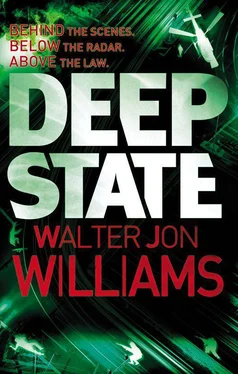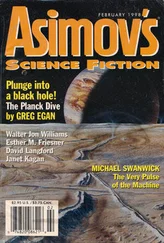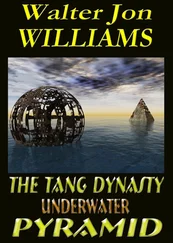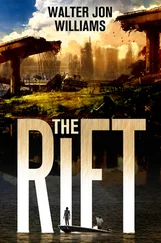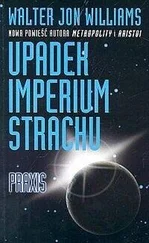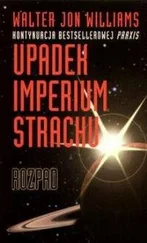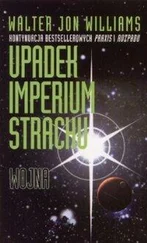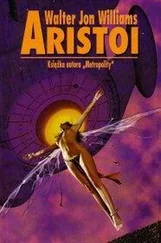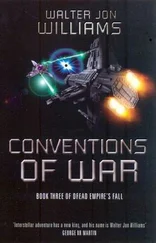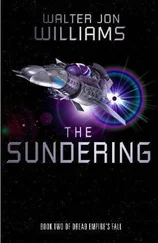Walter Williams - Deep State
Здесь есть возможность читать онлайн «Walter Williams - Deep State» весь текст электронной книги совершенно бесплатно (целиком полную версию без сокращений). В некоторых случаях можно слушать аудио, скачать через торрент в формате fb2 и присутствует краткое содержание. Жанр: Киберпанк, на английском языке. Описание произведения, (предисловие) а так же отзывы посетителей доступны на портале библиотеки ЛибКат.
- Название:Deep State
- Автор:
- Жанр:
- Год:неизвестен
- ISBN:нет данных
- Рейтинг книги:5 / 5. Голосов: 1
-
Избранное:Добавить в избранное
- Отзывы:
-
Ваша оценка:
- 100
- 1
- 2
- 3
- 4
- 5
Deep State: краткое содержание, описание и аннотация
Предлагаем к чтению аннотацию, описание, краткое содержание или предисловие (зависит от того, что написал сам автор книги «Deep State»). Если вы не нашли необходимую информацию о книге — напишите в комментариях, мы постараемся отыскать её.
Deep State — читать онлайн бесплатно полную книгу (весь текст) целиком
Ниже представлен текст книги, разбитый по страницам. Система сохранения места последней прочитанной страницы, позволяет с удобством читать онлайн бесплатно книгу «Deep State», без необходимости каждый раз заново искать на чём Вы остановились. Поставьте закладку, и сможете в любой момент перейти на страницу, на которой закончили чтение.
Интервал:
Закладка:
“There’s a problem,” Lincoln said. He turned to Lloyd. “Can you get us a close-up of what’s happening at the statue?”
“Where’s Rafet?” Dagmar asked.
“Caught in the crowd across the street,” Helmuth said.
Tuna was shouldering his way through the crowd, and then Dagmar’s heart lurched as she saw the danger through Tuna’s eyes.
The army had put a pair of armed guards on the monument. They were in ceremonial blue tunics, with white belts and white gloves, and clearly intended as a symbolic presence. Their white helmets somewhat resembled those of the Keystone Kops.
But the guards’ helmets were not amusing, and their assault rifles were not symbolic. They were real, and they were being brandished at the crowd by the white-gloved hands.
The soldiers had mounted the monument’s square foundation, then backed up to the base of the Ataturk plinth and now had nowhere left to go. The crowd formed a half circle around them, silent except for the clicking sound coming from cell phone cameras recording the guards’ dilemma. The guards’ shoulders were touching-they were giving each other what support they could-and their wide eyes stared wildly at the crowd that had materialized before them.
They probably weren’t paying a lot of attention to the hands holding colorful greeting cards. It was the masked, advancing, sinister faces that they would find threatening.
Anything could happen now. If the soldiers panicked they could mow down scores of the close-packed demonstrators before they themselves were either torn to bits or left alone on the scene of their bloody triumph. If the mood of the crowd turned to anger, a mob could attack the guards and bloodied or murdered soldiers seen lying at the feet of Ataturk would be a propaganda triumph for the military government.
Christ, Dagmar thought. Why does it have to be Tuna? Tuna was hot tempered and utterly fearless-of all her crew, Tuna would be the one to lose his patience and charge the guards.
Tuna muttered into his microphone.
“You didn’t scout the target?” Ismet translated.
“Rafet checked it yesterday,” Dagmar said. She didn’t bother to transmit the answer-she didn’t want to distract Tuna when he was confronted by armed soldiers.
Tuna paused for a moment, and then he stepped onto the monument’s meter-high foundation. Dagmar gasped, heart thundering, as both rifles swung toward her-toward him- and then he raised his hands, one of them still clutching his bullhorn. He spoke in a soft voice.
“Please, brothers,” Ismet translated. “Don’t shoot.”
The soldiers shuffled a little, but they didn’t lower their weapons.
“Brothers,” Tuna said, “we just want to write some postcards. We’re not here to attack you.”
The soldiers looked nervously at each other, and their white-gloved hands loosened their grips on their rifles.
Tuna continued to speak in his soft voice.
“If you wish to leave,” he said, “we’ll make a way for you.” He turned back to the crowd. “Make a path for the brave soldiers!” he called.
In silence, the crowd parted, creating a narrow lane leading across the road toward the old parliament building. Tuna turned back to the soldiers. Their terrified eyes looked like craters in their heads.
“Please, brothers,” Tuna said. “Leave in peace.”
“Inshallah,” Ismet muttered.
The moment that followed seemed to go on forever. The soldiers looked at each other, then at Tuna, then at the lane that had been cleared for them.
And then they raised the barrels of their weapons and walked toward their escape route.
Dagmar, her head swimming, let go the breath she’d been holding since the start of the confrontation.
“Thank you, brothers!” Tuna called. “We know you are not our enemies!” And then, to the crowd, “Give these brave soldiers some presents!”
A woman in the crowd handed one of the soldiers a colorful scarf as he passed, and the soldier, a little embarrassed, took it. There was a cheer and applause and then more scarves. The last the cameras saw of the soldiers, they were walking through the crowd nearly buried beneath great armsful of pashmina blossoms.
Tuna raised his bullhorn.
“Now, let us write on our cards, and make a memorial! And,” he added, “be sure not to vandalize the statue!”
No patriotic Turk would want to see demonstrators scrawling over Ataturk’s monument.
Cards were laid out in colorful patterns, in messages, stuck in the windowsills of the office buildings that overlooked the square. Cards were stood on end and stacked atop one another in towers. Scarves were draped over the statues, hung from neighboring buildings, the antennae of the cars trapped in the massive traffic jam caused by the demonstration.
A man in a shabby jacket who earned his living selling pigeon feed off a table made of a cardboard box was so covered in scarves that he looked like the most colorful mummy in the world.
Rafet finally shoved his way through the crowd, jumped up on the monument’s foundation, and began to bang his drum. He led the crowd through the usual series of marches and patriotic songs.
“This is the biggest crowd yet!” Lincoln said, and raised a clenched fist into the air.
Only a few days, Dagmar remembered, after the last demo had been shot to bits. The Turks were tough.
The Skunk Works drones showed a few police hanging a respectful distance from the crowd, none of a mind to interfere. The crowd so outnumbered them that they had opted for prudence, even if they were armed and the crowd was not.
Three men in suits and ties jumped up next to Rafet. They pulled scarves off their faces and began to harangue the crowd. Cameras jumped and focused on them.
“Who are these guys?” Dagmar demanded.
Ismet listened for a moment.
“Politicians,” he said. “The one in the middle is a guy named Erez-used to be mayor until the generals fired him and banned his party. I didn’t catch the other names.”
The politicians shouted on, mostly inaudible. The crowd cheered them anyway.
“Someone’s trying to hijack our revolution,” Helmuth said. He sounded offended.
“That’s supposed to happen,” Lincoln said. “It’s not our revolution anyway.”
Tuna’s video glasses began to pan wildly overhead.
“Police drone,” he said in English. “It’s up on the north side, moving east.”
Lloyd began giving orders to his air force. He was so busy with this that he lost track of the images coming in from the Skunk Works drones, and when he caught up he gave a shout.
“Police convoy coming up from Kizilay!” he said. “Another forming in the Dikmen police complex!”
Dagmar spoke directly to Tuna and Rafet.
“Time to disperse,” she said. “Police are coming from the south.”
The two acknowledged. Lloyd sent the same message to the camera teams.
Tuna and Rafet raised bullhorns and told everyone to go home. Greeting cards fluttered silver in the air, shimmering like the leaves of olive trees.
For the next few minutes Dagmar was diverted by the entertaining sight of one of the Skunk Works wedges trying to bring down the police drone. The pilot kept missing, and the police drone kept turning its lazy circles undisturbed, like a blind man wandering in a bullring. Finally the wedge managed to clip its target’s tail, and presumably the police drone went down-it was impossible to know for certain, because the video feed from the Skunk Works craft went black at the instant of the crash.
Lloyd told the operator to trigger the sequence that would send the drone navigating via GPS to its launch point. They would have to hope for the best.
Dagmar turned back to the screen that was still showing Tuna’s point of view. Tuna was looking down at his cell phone and yanking it apart. He pulled out the SIM chip, snapped it in half, and let it fall onto the road. Then he looked up.
Читать дальшеИнтервал:
Закладка:
Похожие книги на «Deep State»
Представляем Вашему вниманию похожие книги на «Deep State» списком для выбора. Мы отобрали схожую по названию и смыслу литературу в надежде предоставить читателям больше вариантов отыскать новые, интересные, ещё непрочитанные произведения.
Обсуждение, отзывы о книге «Deep State» и просто собственные мнения читателей. Оставьте ваши комментарии, напишите, что Вы думаете о произведении, его смысле или главных героях. Укажите что конкретно понравилось, а что нет, и почему Вы так считаете.
